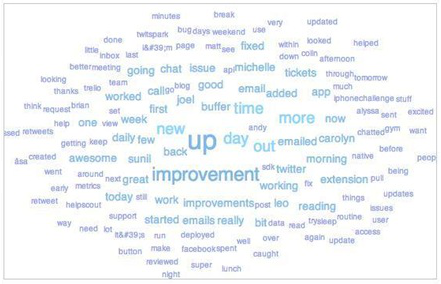Buffer stands out among startups not just for its success in building a great social media sharing tool but in fashioning a company culture focused on making work fulfilling, impactful, and enjoyable. What’s fascinating is that they do this as a completely distributed team, spread across multiple countries and time-zones.

Treat People in the Best Way
Co-founders Joel Gasciogne and Leo Widrich set the foundation for Buffer’s culture according to the tenets of Dale Carnegie’s How to Win Friends and Influence People. Carolyn Kopprasch, Buffer’s Chief Happiness Officer translates what that means for Buffer’s modus operandi: “We want to treat people in the absolute best way we can, and that includes co-workers, vendors, and customers.”
It also includes how the Buffer employees treat themselves. With a unique self-improvement program, they share their progress on anything from time management to healthy eating with their teammates, spurring conversations about different lifehacks and routines. Michelle Sun, Buffer’s growth and analytics expert, tracks fitness routines and getting up early while Leo has been making strides with learning how to code.

Co-workers become a collective accountability partner for future plans like blogging or exercising, and more importantly, they become an incredible support system. Instead of looking askance when you’re doing work to do something to take care of yourself, you receive encouragement. “If you’re trying to work on your health or your fitness or your happiness level, that affects work a lot too,” Carolyn explains.
Work Smarter, Not Harder at Buffer
It’s not surprising then, that one of the company’s mantras is to work smarter, not harder — taking time to review what’s working and how to improve operations. As a remote team, Buffer needed a better way to stay on the same page. Previously, everyone would get on a daily group Skype call in which each person would take three minutes to talk about what they did, how their co-workers could help, and their improvements. With the team growing larger and the standup process proving unwieldy over email, Buffer turned to iDoneThis.
 Leo remarks, “It allows us to track performance, which easily gets lost in a chat room or an in-person standup. If new people come on board, they can look through and see what has been worked on. And of course, it’s amazing to keep in sync with everyone, working as a remote team. iDoneThis is invaluable to us and has changed our productivity for the better.”
Leo remarks, “It allows us to track performance, which easily gets lost in a chat room or an in-person standup. If new people come on board, they can look through and see what has been worked on. And of course, it’s amazing to keep in sync with everyone, working as a remote team. iDoneThis is invaluable to us and has changed our productivity for the better.”
Michelle agrees, “It’s a way to understand what teammates are working on, and every time I read people’s iDoneThis, I feel connected with the team.” Where iDoneThis shines, for Carolyn, is the ability to comment and have chronicled conversations about her teammates’ work and improvement practices. “I think that’s one of the biggest things. It’s not just reporting what we’ve done. It’s asking, ‘oh tell me more about that.’”
iDoneThis is a natural fit for Buffer’s culture, but Carolyn points out that iDoneThis has helped them to work even smarter. Holding more traditional standups over video chat meant that “if you jump in and talk about something that somebody just said, you’re basically interrupting their three minutes. So what we would actually do is not ask that many questions.” Now the team can communicate asynchronously — asking, commenting, interacting — without feeling like they’re butting in.
Transparency Fosters Tight-Knit Teams
The extreme transparency that Buffer practices in terms of sharing information from sleep habits to how much salary and equity everyone gets is not without feelings of vulnerability. But what they gain is an incredible feeling of connection. In the Buffer universe, where the personal flows right into work and vice versa, it’s their collective care, attention, and support that binds and strengthens the company.
“When somebody will say to me, ‘you didn’t really get very much deep sleep yesterday. Maybe you can try taking a bath before dinner,’ and you’re like, ‘where am I? Am I at work?’” Carolyn laughs. “It’s unique. It takes a certain type of person to really like that, but having a team that’s really interested in keeping you accountable to your own self-improvement is kind of a wild thing. It’s awesome and a little bit crazy sometimes.”

